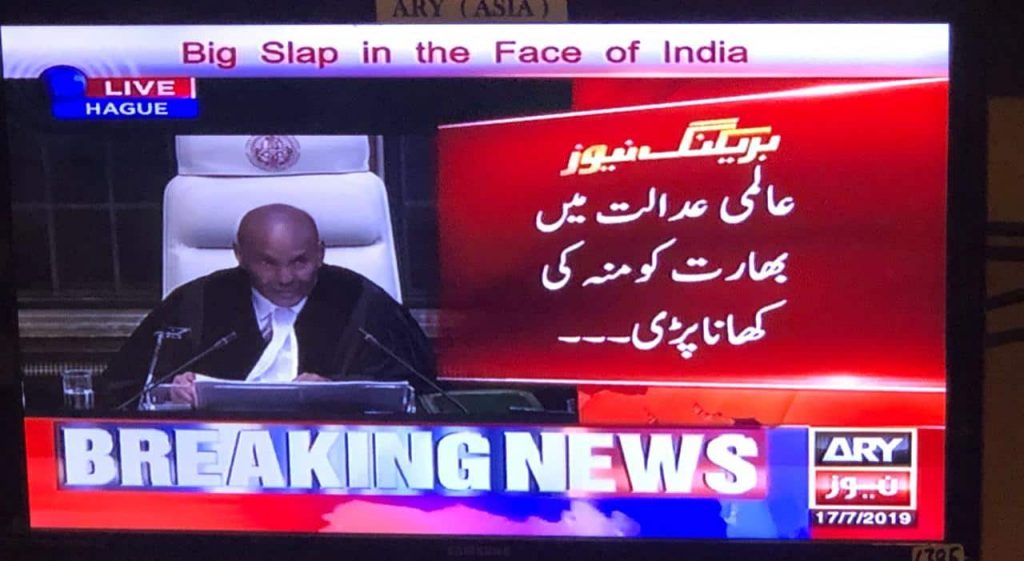With the International Court of Justice (ICJ) finally giving verdict on much-awaited Kulbhushan Jadhav case, both Pakistan and India claimed victory. The narrative in Indian media paints a different picture of the judgment while Pakistan is displaying a totally different side of the story. So who won, India or Pakistan?
After ICJ Ruling, Pakistan ‘Officially’ Grants Consular Access to Kulbhushan Jadhav
PAKISTAN’S WIN:
According to the International Court of Justice, Jadhav’s conviction and sentence by a military court were not to be regarded as a violation of Article 36 of the Vienna Convention, which India had claimed.
“As regards India’s claim based on the Vienna Convention, the court considers that it is not the conviction and sentence of Jadhav which are to be regarded as a violation of the provisions of the Vienna Convention,” read the verdict.

Article 36 states that foreign nationals who are arrested or detained be given notice without delay of their right to have their embassy and consulate be notified of the arrest and have consular officers visit them.
Among other Indian demands were the annulment of the military court’s decision and permitting Jadhav a safe passage to India. However, the same was denied.
INDIA’S WIN:
India had also demanded that Jadhav be tried once again by a civilian court after giving him consular access. No retrial was granted, however, Pakistan was ordered to grant the convicted spy consular access.
India also demanded the relief of “review and reconsideration” for Jadhav, which ICJ granted, but by means of Pakistan’s own choice.

It simply means that Islamabad will have to give consular access to Jadhav which India has been demanding for a long time. A day after the ruling of International Court of Justice (ICJ), Pakistan on has officially declared to grant consular access to Kulbhushan Jadhav.
The announcement was made by Pakistan Foreign Office in a statement in which it said the decision to grant consular access to Indian Naval officer was taken in line with the ICJ decision.
“Pursuant to the decision of the ICJ, Commander Kulbhushan Jadhav has been informed of his rights under Article 36, Paragraph 1(b) of the Vienna Convention on Consular Relations. As a responsible state, Pakistan will grant consular access to Commander Kulbushan Jadhav according to Pakistani laws, for which modalities are being worked out,” said the brief statement
FOREIGN MEDIA:
Meanwhile, international media reports focused on the ICJ’s directive to Pakistan to review its death sentence to Kulbhushan Jadhav.
“World Court Orders Review of Pakistan Death Sentence for Indian Convicted of Spying”, The New York Times‘ headline said. The Washington Post story on the judgment said: “Alleged Indian spy on death row in Pakistan wins a reprieve from execution”.
British media also focussed on the part of the ICJ judgment which went in India’s favour. “UN court orders Pakistan not to execute Indian man accused of spying,” The Guardian said in its report.
KULBHUSHAN JADHAV
As per the allegations of Pakistan, Kulbhushan Jadhav was arrested in an intelligence-based operation in March 2016 from Balochistan after he crossed the border from Iran. He was travelling on a fake name but original Indian passport.
In a recorded video statement, he later confessed of working for RAW and involved in subversive activities both in Balochistan and Karachi, a claim rejected by India. New Delhi said Jadhav was pressurized to give these statement and requested Islamabad for consular access which was rejected that time.
In April 2017, the military court had sentenced Jadhav to death for his involvement in espionage and subversive activities. He later filed a clemency petition before army chief General Qamar Javed Bajwa. His mercy plea was still pending before him.
Meanwhile, India approached the ICJ against Pakistan for not granting consular access to Jadhav. Pakistan repeatedly denied consular access requests based on its interpretation of the bilateral agreement that did not extend the consular facility to spies.




